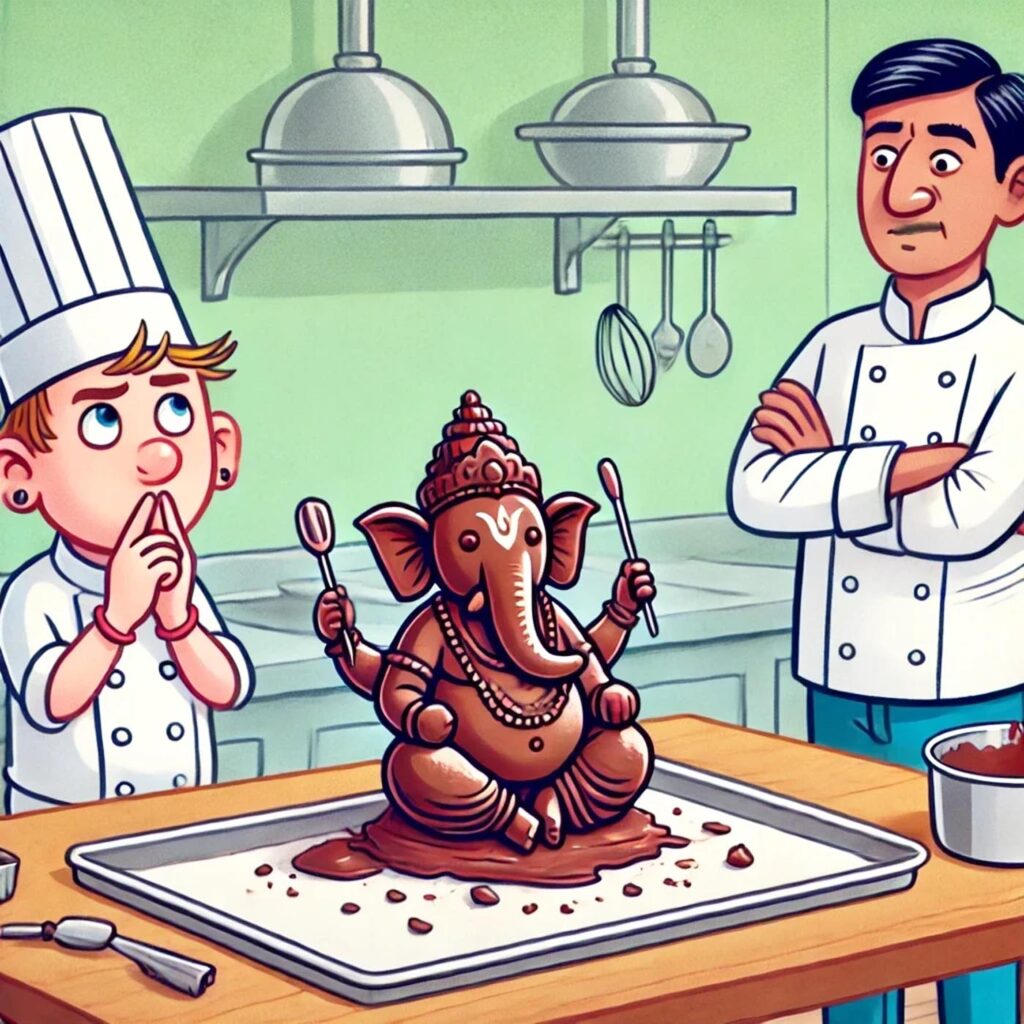“I take it this is your first time making chocolate ganache?”
“If you go on working with the light available, you will meet your master, as he himself will be seeking you.”
Sri Ramana Maharshi (1879-1950)
Meditation can turn fools into sages but unfortunately fools never meditate.
Swami Vivekananda (1863-1902)
The man who works for others, without any selfish motive, really does good to himself.
Ramakrishna (1836-1886), Indian mystic
Hindu society is the only significant society in the world today which presents a continuity of cultural existence and functioning since time immemorial.
Sita Ram Goel (1921-2003), Indian political commentator
Change is not something that we should fear. Rather, it is something that we should welcome. For without change, nothing in this world would ever grow or blossom, and no one in this world would ever move forward to become the person they’re meant to be.
B.K.S. Iyengar (1918-2014), influential yoga teacher
Instead of cursing the darkness, light a candle.
Benjamin Franklin (1706-1790), scientist, philosopher and US founding father
It’s not the love you make. It’s the love you give.
Nikola Tesla (1856-1943), Serbian-American inventor
All problems of existence are essentially problems of Harmony.
Sri Aurobindo (1872-1950)
The devout seeker is he who mingles in his heart the double currents of love and detachment like the mingling of the streams of Ganges and Jumna.
Saint Kabir (1440-1518)
It is difficult to free fools from the chains they revere.
Voltaire (1694-1778), French writer
Kindness in words creates confidence. Kindness in thinking creates profoundness. Kindness in giving creates love.
Lao Tzu (4th or 6th century bce), author of Tao Te Ching
Man is not worried by real problems so much as by his imagined anxieties about real problems.
Epictetus (55-135 ce), stoic philosopher
Normality is a paved road: It’s comfortable to walk, but no flowers grow on it.
Vincent van Gogh (1853-1890)
The earth is a beehive, we all enter by the same door.
Kenyan proverb
Efforts and courage are not enough without purpose and direction.
John F. Kennedy, (1917-1963), Former US president
Look at the sky. We are not alone. The whole universe is friendly to us and conspires only to give the best to those who dream and work.
A.P.J Abdul Kalam (1931-2015), Indian aerospace scientist and statesman who served as the 11th president of India
All honest work is good work; it is capable of leading to self-development, provided the doer seeks to discover the inherent lessons and makes the most of the potentialities for such growth.
Paramahansa Yogananda (1893-1952)
Keep a constant awareness and a conscious effort to say good words, perform good actions, and to practice patience and compassion.
Mata Amritanandamayi, Kerala-based hugging saint
Wonder is the scientist’s way of worship, the rational mind’s spiritual experience.
Anonymous
Do something because you really want to do it. If you’re doing it just for the goal and don’t enjoy the path, then I think you’re cheating yourself.
Kalpana Chawla (1962-2003), Indian-born American astronaut who was the first woman of Indian origin to fly to space
The music that I have learned and want to give is like worshiping God. It’s absolutely like a prayer.
Ravi Shankar (1920-2012), Indian sitarist and composer
In Hinduism belief is only the first step. Hindus want to move beyond just believing in God to experiencing the Divine for themselves.
Bodhinatha Veylanswami, publisher of Hinduism Today
Finally, you go beyond light. Finally, you go into the core of existence itself, the Self God, beyond the stillness of the inner areas of mind. That is the mission and that is what humanity is seeking—total Self-God Realization.
Satguru Sivaya Subramuniyaswami (1927-2001), founder of Hinduism Today
DID YOU KNOW?
The Concept of Atoms

David Nadlinger, Oxford
Long before modern atomic theory, ancient Indian sages envisioned atoms as the smallest building blocks of matter. Around 600bce, Sage Kanada introduced the concept of anu—meaning atom—in his Vaisheshika Sutra, proposing that all matter is composed of these tiny, indivisible particles. Kanada’s description of atomic behavior closely mirrors ideas in modern science. Sutra 7.1.9 states: “Each atom holds a dual nature of shared and specific attributes, making it the elementary, indivisible unit that forms the basis of all material objects.” This duality reflects Kanada’s theory of anu as not only the fundamental components of physical matter but also as elements with unique characteristics.
There are several accounts in the Hindu scriptures indicating an early grasp of atomic theory. Kanada’s atomic theory described atoms as having distinct properties, like weight and motion, which determine how they combined to form objects. This view aligns with modern chemistry, where atoms bond to create molecules. Yet, Kanada’s vision went further, connecting atoms to both physical and spiritual realms.
The Tirumantiram, by the Tamil saint Tirumular, also touches on cycles of creation and destruction, with Siva’s cosmic dance symbolizing the endless transformation of material elements. Tirumular describes Siva’s dance as both the force of destruction and regeneration, a cycle that embodies srishti (creation), sthiti (preservation) and samhara (dissolution). This aligns with Kanada’s cyclical view of the universe, where atoms continually combine, break apart and reform in a perpetual cycle of rebirth and decay. Kanada suggested that the universe is in constant flux, with atoms endlessly combining, break apart and reforming. In sutra, 7.1.22 he states, “anavah samyoga-vibhaagabhyaam drishyate,” meaning that atoms become observable through their fluctuations between “associative and dissociative” states.
Kanada’s work demonstrates an early scientific inquiry in India that parallels many ideas in modern atomic theory. His perspective on the universe, as a continuous process of formation, dissolution and reformation, offers a unique bridge between ancient metaphysical views and modern science’s understanding of atomic behavior.
